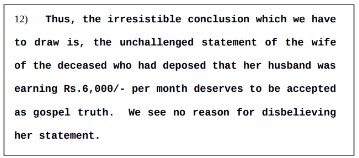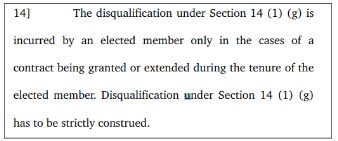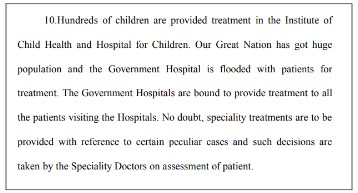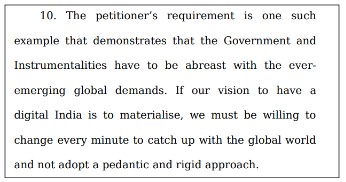In this edition of court judgements review, we look at the Supreme Court’s judgements that Railways is not responsible for the theft of a passenger’s belongings, that unchallenged statement of the deceased’s wife regarding his salary was to be accepted as the gospel truth, Madras HC’s statement that preferential treatment of child in government hospitals which are already flooded with patients is not possible, among others.
SC: Railways is not responsible for theft of passenger’s belongings
In the case, Station Superintendent & another vs. Surender Bhola, the respondent was travelling through a train of the Indian Railways when the cash he was carrying, one lakh rupees, got stolen. He filed a case before the district forum seeking reimbursement of the stolen money as he contended that the theft was due to the deficiency in the services of the Railways. The forum allowed the plea and asked the Railways to reimburse the amount. The case was then taken to the State as well as National Consumer Disputes Redressal Commissions which also upheld the same decision.
The Bench of Justices Vikram Nath and Ahsanuddin Amanullah of the Supreme Court while hearing the appeal by the Indian Railways, set aside the orders passed by the commissions and the forum and stated that the railways cannot be held responsible for the theft if the passenger failed to protect his own belongings.

SC: Unchallenged statement of the deceased’s wife regarding his salary was to be accepted as the gospel truth.
The appellants in the case Mamta Devi & Others vs. The Reliance General Insurance Company Limited & Another are the family members of deceased Vakil Choudhary who was a truck driver. The family had filed a claim petition before the ‘Deputy Labour Commissioner-cum-Commissioner for Workmen Compensation’, seeking compensation for his death which occurred during employment. They had claimed that the deceased was earning Rs. 6,000 per month which was also admitted by the employer. The respondent insurer of the offending vehicle had filed its written statement. However, the matter was not followed up by the employer or the insurer.
Based on available material evidence that came to be placed by the claimants, the Deputy Labour Commissioner-cum-Commissioner for Workmen Compensation, the income of the deceased was taken as Rs. 3,900 per month as per the minimum wage of Rs. 150 per day. Hence, the amount payable by the insurer was passed for a lower sum. This was challenged before the Patna High Court which dismissed the appeal stating that it was a contested case. The High Court’s order was challenged at the Apex Court.
The Supreme Court Bench of Justices J K Maheshwari and Aravind Kumar observed that the Employer had admitted the statements in the appellant’s claim, and so the claim was uncontested. It also noted that the Insurer did not cross-examine the claimants and their witnesses and paid the amount without challenging the same.
Further, the Court also observed that the Deputy Labour Commissioner had erroneously computed the deceased employee’s wage as per minimum wage, even though the deceased’s wife had mentioned the monthly wage in her statement. It noted that the unchallenged statement of the deceased’s wife was to be accepted as the gospel truth.
The Bench took an empathetic view as the family has been waiting for compensation. Instead of remitting the matter back to the High Court, the Supreme Court set aside the High Court’s order and awarded an enhanced amount and a higher interest rate from the date of the accident to the date of payment after reducing the amount already paid by the insurer.

Bombay HC: Disqualification under Section 14 (1) (g) Maharashtra Village Panchayat Act, 1958 is possible only if contract is being granted or extended during the elected member’s tenure
In Mankarna wife of Nagorao Kale vs. State of Maharashtra, the petitioner had contested general elections for a gram panchayat in Maharashtra in 2021. She was elected as the Sarpanch from the ST category. Later that year, a village resident, Vitthal filed a complaint against the petitioner seeking her disqualification under the Maharashtra Village Panchayat Act, 1958. As per a provision of the Act, a member who has any share or interest in any work done by Panchayat’s order contract, directly or indirectly, by himself or through their partner may be disqualified. In this case, the petitioner’s husband did labour work of cleaning drainage, light fitting, etc. He was paid for his work by the petitioner after becoming Sarpanch of the Village Panchayat.
The High Court noted that the petitioner’s husband had done work in 2020, before the elections for which the payment was made by the Sarpanch after coming into power. The High Court Bench of Justice Arun R Pedneker allowed the petition adding that the petitioner’s payment to her husband is merely a consequence of the labour work done by the husband of the petitioner at an earlier point in time and so, the disqualification under Section 14 (1) (g) of the Act of 1958 is not applicable. The provision is applicable only in a contract is being granted or extended during the tenure of the elected member.

Madras HC: Preferential treatment of child in government hospitals which are already flooded with patients is not possible
The petitioner in the case, K Mubeena Babu vs. the Tamil Nadu Health & Family Welfare Department and Ors was pregnant and took treatment at the Primary Health Centre. She stated that her child’s health had deteriorated because of the negligence of the doctors at the Health Centre, who did not perform an anomaly scan at 18 weeks of pregnancy. Further, because of the lack of delivery facilities in the Health Centre, she was referred to another hospital where she delivered the baby. The baby was born with facial deformities because of which she was referred to another hospital which identified a cardiac anomaly in the baby.
She was then referred to and admitted to the Institute of Child Health and Hospital for Children for speciality treatment wherein the child was referred to take Echo Cardiogram. Cardio-Thoracic Surgery (CTS) was later recommended for further treatment. However, the hospital discharged her baby without conducting the CTS and asked her to visit the hospital in case of an emergency. As per the institute’s directions, she again visited the hospital after a month for an opinion on CTS but a physician at the hospital refused treatment of the child and informed her that there was no scope of life for the child.
While the petitioner appealed for a compensation of Rs. 25 lakhs for the negligence on behalf of hospitals, the Madras High Court Bench of Justice S M Subramaniam noted that the Institute of Child Health and Hospital for Children for speciality treatment had already constituted a committee of experts who are monitoring the child’s treatment. It noted that the doctors were already treating the child as per medical protocol and ethics and that there was no reason for the court to interfere with the treatment. Furthermore, it said that the government hospitals in the country are already flooded with patients and preferential treatment for the child was not possible. The bench dismissed the plea adding that the courts cannot be expected to interfere with the decisions of the specialist doctors regarding the treatment to be provided to patients.

Kerala HC: Government and Instrumentalities must be abreast with emerging global demands
In the case, Ejo P J vs. Regional Passport Office & Another, the petitioner was employed in Kuwait. He was alleged to have committed matrimonial offences by his estranged wife. The Police Clearance Certificate issued by the Regional Passport Office to be submitted to the Embassy of Kuwait did not contain a barcode because of which the Embassy refused to accept the same. The Passport Office contended that the clearance certificates are outsourced and cannot issue the certificate with a barcode when there is a pending criminal case.
The reason provided by the Passport Office for not issuing the certificate as per the required format was stated as cavil, naive, and unacceptable by the Kerala High Court. The Single Bench of Justice C S Dias stated that the certificates issued by the government and statutory authorities have to be internationally accepted considering India is a signatory to international conventions and treaties. He added that we are in an AI era and transforming into 5G and India is a front-runner in technology. Citing the requirement raised by the petitioner, in this case, is a demonstration that the government and instrumentalities have to be abreast with the emerging global demands, the bench asked the competent authority under the Ministry of External Affairs to take immediate steps to upgrade the central database and issue the Police Clearance Certificate with the barcode, scanned photograph and details of criminal cases of the person concerned.



